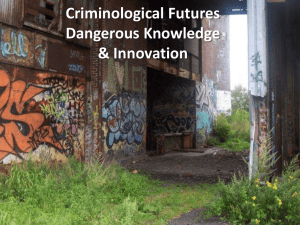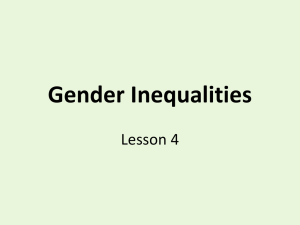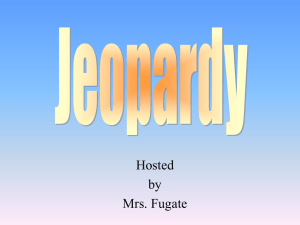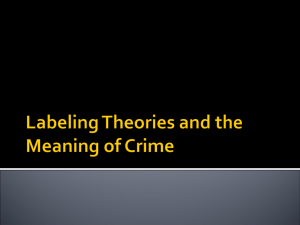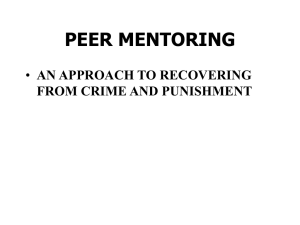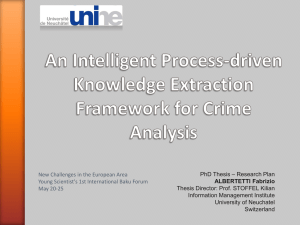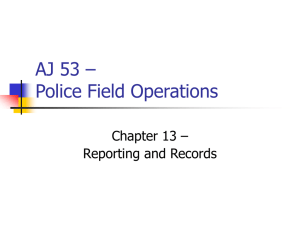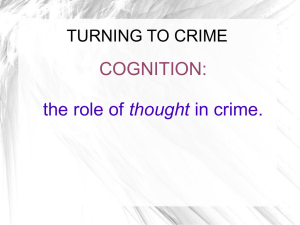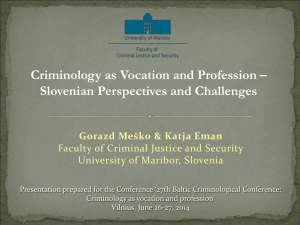Left and Right Realism - MMU Understanding Criminology
advertisement
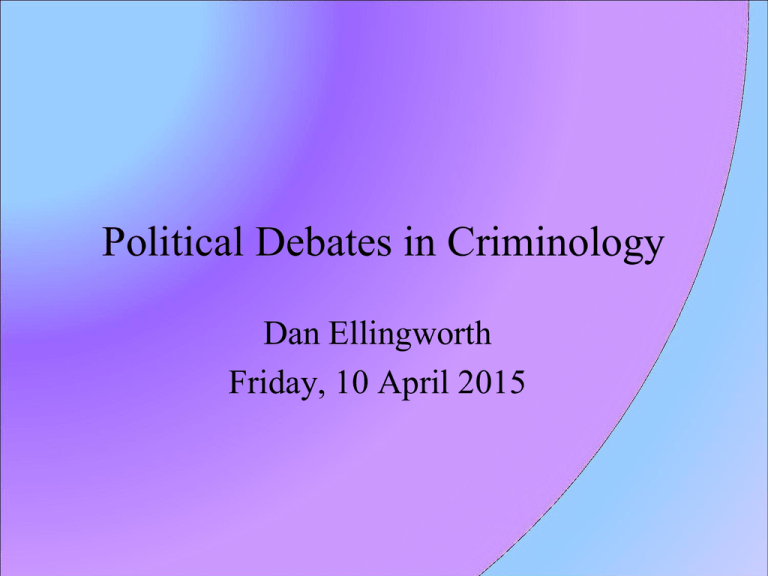
Political Debates in Criminology Dan Ellingworth Friday, 10 April 2015 Lecture Outline • Critical Criminology • Right Realism • New Labour Marxist Criminology • Fully social theory • Conflict Theory (class) • Law and Order Ideology • Critique of CJS • Critical of link between class and offending • Awareness of link between class and victimisation Feminist Criminology • Conflict theory (gender) • “Hidden” Crime • Victimisation • Criminology as part of dominant ideology • Suspicion of Official Statistics • Methodological concerns Critical Criminology Labelling Theory • Subjectivity: no act is inherently deviant • Variability in the application of social control • Social Construction of deviance • The Law causes Crime Initial Inspiration: Marxism • All aspects of society seen in terms of revolutionary conflict between the working class (proletariat) and the ruling class (bourgeoisie) • A macro-level perspective – Differs from functionalism in that the maintenance of capitalist society is based on conflict, not consensus – Ultimately, this conflict will bring about the end of capitalism – In order to maintain capitalist society, it is necessary for the ruling class to develop a dominant political ideology to justify their position: the law represents part of this ideology • Was Marx a criminologist? Crime …. the struggle of the isolated individual against the predominant relations” (The German Ideology) • an expression of powerlessness of the ‘dangerous classes’ or lumpen-proletariat Marxist Criminology • Crime is – Egoism and individualism encouraged by capitalism (Willem Bonger) – The criminal law represents a ruling class definition of deviance, which they themselves can break with impunity. The criminal justice system reflects and reinforces class division (eg. Jeffery Reiman) – An expression of class conflict (Paul Q. Hirst) • the criminal law acts to suppress this by force • socialization acts to internalise ruling class ideology Left Idealism Left Realism • Ian, Taylor, Paul Walton and Jock Young “The New Criminology” – Crime are acts criminalised by the ruling class in their interest: in a society without widespread inequality (i.e. socialism), the power to criminalise would be removed • Viewed the simplicity of left idealism as unrealistic – Crime cannot be seen as an expression of class consciousness – Most working class crime is against the working class – Idealistic forms of Marxism losing political currency in a climate of the rise of the New Right – Need to consider issues of The State, Society, Offenders and Victims Left Realism’s “Targets” • Orthodox criminology – Crime is not the result of under-socialization – Socialization into capitalist world of egalitarianism and material deprivation causes crime – Crime is not an individualized response, but a group / cultural response • Reliance on Official Statistics – working class criminality is re-emphasised and exaggerated – Reflects “over-policing”, but over-emphasises real differences: under-estimating middle and upper class crime, but also working-class crime – A critical application of statistical evidence, particularly self-report and victimisation studies can inform theory Conservative Criminology Understanding the Individual: Rejecting the Social Uncritical Common-sense Management of Crime Control Punitive Morality Control Theories of Criminality • Very different notion of “human nature” from most criminological theories • Traditionally: – How do social structures work to push people to commit crime? • Control Theories: – Why don’t people commit crime? • Human nature essentially anti-social – need to understand how this is controlled Thomas Hobbes Travis Hirschi “Delinquent acts result when an individual’s bond to society is weak or broken” • Criminality can be directly equated, in all circumstances, to low selfcontrol • Social bonds act to contain individuals 4 elements of social bond 1. Attachment - Interest in each other: to parents, schools, and peers 2. Commitment - Time and energy spent pursuing conventional actions produces social capital that would be jeopardised by criminal activity 3. Involvement - “Devil makes work for idle hands” 4. Belief - Broad agreement with societal values Right Realism • Politically conservative: consensus position • Not really concerned with identifying causal explanations for offending – "To people who say "crime and drug addiction can only be dealt with by attacking their root causes", I am sometimes inclined, when in a testy mood, to rejoin: "stupidity can only be dealt with by attacking its root causes". I have yet to see a "root cause" or encounter a government programme that has successfully attacked it...". James Q. Wilson • Non-problematic acceptance of official definitions of crime, measurement of offending, and identification of criminality Aims of Right Realism Deterrence Prevention Punishment Segregation Punishment the key concept James Q. Wilson • American criminologist and academic: advisor to numerous US presidents on crime since mid-1960s • “Thinking about Crime” – root causes of criminality cannot be identified – increasing punishment as a deterrent unlikely to work – All we can do is to reduce the impact of crime on people’s lives James Q. Wilson: “Solutions” • At a societal level – A call for re-moralization of society: emphasizing societal bonds • At a micro-level – Adjust the cost / benefit balance of criminality – Make crime too difficult or risky Administrative Criminology • “Establishment” criminology in UK and USA • An empirical project • A rational choice perspective • A reaction to the perceived failure of criminology to intervene in causes of criminality Routine Activities Theory: Marcus Felson Crime event will occur when 3 things coincide in time and space Motivated Offender Crime Suitable Victim Lack of Capable Guardian Aim: disrupt this coincidence: remove opportunities for crime Conservative and Right Realism: Common Themes • Not concerned with explanations for criminality • Rational Choice perspective • Uncritical use of statistical evidence • Unproblematic Criminal / Non-criminal distinction • Management of crime opportunities: surveillance / dispersal of control Criticisms of Right Realism • Right Realism is an expression of political expediency: an appeal to base fears of – The working class – Ethnic Minorities – The criminal classes • The rejection of search for causes is actually a rejection of theory • Deterrence is an impractical basis for a criminal justice system – Result in denial of civil liberties for the majority New Labour and Law and Order • A central plank of the New Labour project – Competency, rather than ideology – Competence = toughness – “Tough on crime, tough on the causes of crime” • In Office – – – – “What Works” Agenda Reduction in Crime Figures, though fear up No reduction in sentencing severity Some more liberal steps: Human Rights Act; Macpherson Report; some Youth Justice changes; multi-agency work; restorative justice – Managerialism
